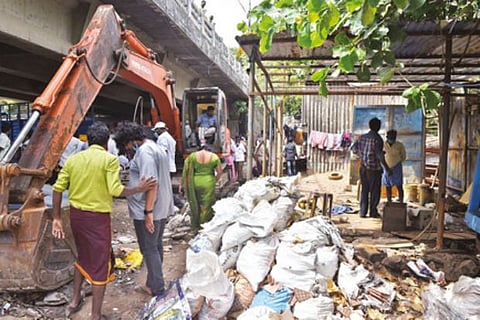

Chennai
The report, authored by Vanessa Peter and Ragamalika Muraleedharan, noted that 2,045 families were evicted in the State, including 672 in Chennai, even during the pandemic in 2020. “The government is planning to evict another 2,000 families from 10 settlements along Cooum and 5,000 families residing along the Adyar river,” it said, noting the recent drive to evict 247 families from Radhakrishnan Nagar.
“Evictions during the pandemic further increases the vulnerabilities of communities and pushes them to poverty,” said the report titled ‘Policy perspectives on the existing urban development programmes and its implications on the vulnerable sections – Tamil Nadu’.
A detailed analysis by IRCDUC revealed that over the last five years, families from 69 settlements were evicted and resettled in five different sites. Of them, 60 were done in the middle of the academic year; no prior consultations were held with the families in 64 cases; and no legal notices were issued in 68 cases. Only three per cent of evictions saw opposition parties raising the issues, the report added.
Of the eviction of 61,968 families in the last two decades, 18,723 were shunted out after the 2015 floods – and in 96 per cent of the cases, restoration of waterbodies was cited as the reason.
The report asked the government to launch the urban version of the Periyar Ninaivu Samathuvapuram scheme in urban areas by ensuring the allotment of houses for the poor, including the homeless, LGBTQ communities, persons with disabilities and women-headed households in the TNHB and TNSCB settlements.
It also sought linking TNSCB’s plans on housing for the urban poor under the area development project of Smart Cities Mission to ensure holistic development of the settlements. “Resettlement should be the final option only when there are no alternatives available. If there is resettlement involved in the process, it should be within a 3-kilometre radius to ensure the continuation of livelihoods and education as well as access to food, water, and healthcare,” it recommended.
Visit news.dtnext.in to explore our interactive epaper!
Download the DT Next app for more exciting features!
Click here for iOS
Click here for Android